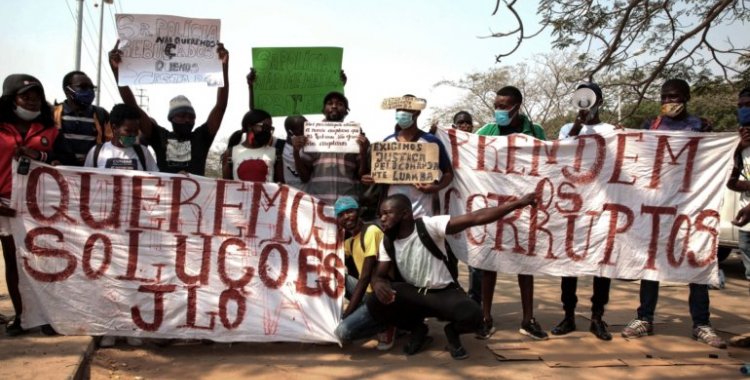The demonstrators began to concentrate near the cemetery of Santa Ana, around 11am, to prepare their posters, but they did not leave until 1pm, parading towards the Largo das Escolas, shouting the slogans expressing their concerns: light, water, bread, education.
"We want basic food, we don't want candy", was heard at the start of the parade, in an allusion to the phrase of the Minister of the Interior, Eugénio Laborinho, who, in a press conference, responded to complaints of police violence during the state of emergency due to the pandemic, saying that the police "were not to distribute candy".
Ermelinda Tchikuamby, displays a poster asking the police not to kill her and explains to Lusa that she joined the protest to denounce the situation the poorest are experiencing.
"There are neighborhoods in Luanda that are living badly, it hurts the heart. Basic food was promised, but these people were not given a basic food basket," said the law student, pointing out that many of those who do not comply with the confinement that the Angolan authorities repeatedly call for would stay at home if they had food.
The 28-year-old also questioned the country's transition from a state of emergency to one of calamity, when cases of covid-19 infection increased.
"There are people who don't know what a state of calamity is and think they don't have coronavirus in the street and [they say]: 'if I'm hungry, I'll go out and sell it' and here come the lords of public order beating because they should be at home," Ermelinda Tchikuamby criticized.
The student stressed that the activists want to promote "a peaceful demonstration, without any problem, without any aggression," but said that the police are quick "to shoot and kick".
"So I'm asking you not to kill me," he justified, pointing out the poster.
Timóteo Miranda, one of the organizers, explains that the march had several objectives, among which to draw attention to the situation due to the pandemic.
"We are in a very sensitive phase where health is in danger, but the state never ceases to be state", said the activist, regretting that many people had "suppressed their fundamental rights and freedoms".
The activist spoke of several problems, from teachers in private schools, who have not been paid for months, to poor access to water in the most vulnerable communities.
"We understand that it is necessary to sanitize ourselves against covid-19, but we also understand that it is necessary for the executive to create conditions for water to reach the most distant points of the country", he demanded.
"How are we going to demand that people stay at home, if people don't have what to eat, if a large part depends on the informal market", he questioned, criticizing "the systematic persecution of the zungueiras, who do their business".
As for the weak protest mobilization, Timóteo Miranda admits it is related to the lack of citizenship, but also some fear, which makes there are fewer and fewer people on the street.
"There is a lack of incentive to citizenship, we are labeled as frustrated because we exercise citizenship," stressed the 21-year-old student of Education Sciences.
"People haven't left the cave yet because the executive doesn't make it easy either, it makes people afraid to exercise their citizenship," added Timóteo Miranda, stressing that the most important thing was that the young people were able to convey their messages.
On the posters there were protests to the party in power in Angola more than 40 years ago - "MPLA is a disgrace" - but also appealed for solutions to the executive led by João Lourenço and the arrest of the corrupt.
Singing "united activists will never be defeated", the young people who joined the demonstration, where it was compulsory to wear a mask to comply with biosecurity measures, were accompanied by the police to the Largo das Escolas, where a manifesto with the demands was read and the protest ended, without incident, at 3.30pm.







